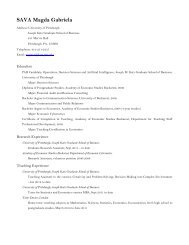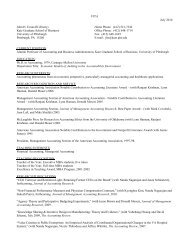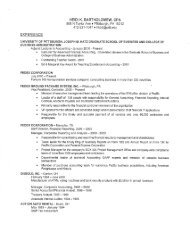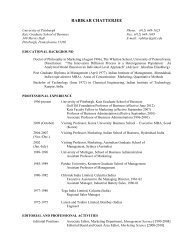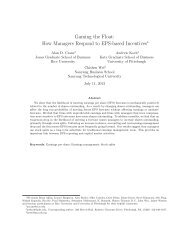Stuart L. Gillan, Jay C. Hartzell, Andrew Koch, and ... - Pitt Business
Stuart L. Gillan, Jay C. Hartzell, Andrew Koch, and ... - Pitt Business
Stuart L. Gillan, Jay C. Hartzell, Andrew Koch, and ... - Pitt Business
You also want an ePaper? Increase the reach of your titles
YUMPU automatically turns print PDFs into web optimized ePapers that Google loves.
struggled with identification issues, <strong>and</strong> without a perfect instrument or natural experiment, we<br />
analyze ESG behavior along multiple dimensions – operating performance, compensation policy,<br />
institutional investor behavior, <strong>and</strong> valuation – in order to gain a fuller underst<strong>and</strong>ing of which<br />
firms appear strong from an ESG perspective <strong>and</strong> how these strengths are viewed by, <strong>and</strong> acted<br />
upon, by market participants. While the literature has tended to focus on a single aspect of CSR<br />
or ESG, we study ESG as a whole, along with each of its components. Specifically, we use<br />
KLD’s measures of environmental, social, <strong>and</strong> governance practices which they express as<br />
strengths, concerns about the firm in the area, <strong>and</strong> a net score of strengths less concerns. Given<br />
the importance of KLD as a market leader in this area, <strong>and</strong> their market share among institutional<br />
investors, our results also shed light on the degree to which their widely-used measures of ESG<br />
are correlated with firm performance, other firm governance choices, <strong>and</strong> institutions’ observed<br />
trading behavior.<br />
In examining the relation between ESG <strong>and</strong> operating performance, we find a consistent<br />
positive association between firms’ returns on assets <strong>and</strong> their net scores for all three components<br />
– environmental, social, <strong>and</strong> governance. Decomposing the return on assets into asset turnover<br />
<strong>and</strong> operating expense ratios, we find that the positive association between ESG <strong>and</strong> operating<br />
performance stems from reductions in operating expenses for firms with higher ESG<br />
performance, as opposed to greater sales per dollar of assets. This suggests that high ESG<br />
performance firms are more efficient (e.g., through lower wages per dollar of assets), or that<br />
more efficient firms are more likely to adopt high-ESG practices. Generally, though, these<br />
results are inconsistent with the third motive for ESG/CSR behavior put forth by Benabou <strong>and</strong><br />
Tirole (2010) <strong>and</strong> Baron (2008). That is, based on operating performance analyses it does not<br />
appear that managers adopt stronger ESG policies to pursue their own self interest.<br />
To further test for the tendency of managers to adopt ESG practices for their own<br />
interests rather than those of the shareholders, we next focus on the association between CEO<br />
compensation <strong>and</strong> ESG performance. Measuring ESG by the net (strengths minus concerns) or<br />
by concerns alone we find consistent results across all three measures in that CEOs with greater<br />
6




